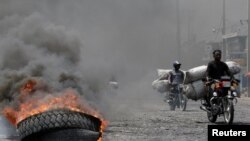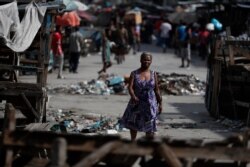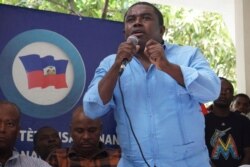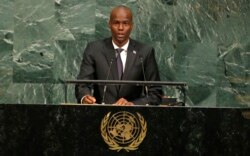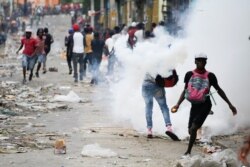Unrest in Haiti has disrupted hospitals, orphanages and emergency services while keeping some 2 million children from school, the United Nations said Wednesday.
The warning from U.N. spokesman Stephane Djuarric came as there was a relative pause in disturbances that have wracked Haiti's capital for weeks as protesters have tried to drive President Jovenel Moise from power. People once again stood in line to buy gasoline and some banks and businesses cautiously reopened, despite scattered roadblocks formed by burning tires.
"Fuel shortages, lack of safe water and other essentials are also affecting orphanages, civil protection units and other emergency services, which are also functioning with limited capacity," Dujarric said at the United Nations.
In addition, with many schools closed for the past two weeks, an estimated 2 million children have no access to education, he said.
Dujarric said U.N. humanitarian officials warned that the disturbances threaten to worsen hunger in one of the hemisphere's poorest nations.
The embattled president has kept largely out of the public eye in recent days, but has given no indication that he will step down.
As the standoff continues, Haitians wonder who will yield first: the protesters or the president.
Core Group meeting
One opposition leader, Andre Michel, told The Associated Press on Wednesday that his coalition is calling for removing both parliament and the president in a wholesale renovation of the country's political institutions. He said his group has created a commission meant to oversee a transfer of power and create some sort of body to replace the current parliament.
While parliamentary elections are scheduled for Oct. 27, postponement seems inevitable, adding to the sense of stalemate.
"It's a dramatic situation, a chaotic situation," said Evans Paul, a former prime minister and Moise ally who privately discussed the crisis Monday with the Core Group, which includes officials from the United Nations, United States, Canada, France and others.
Paul told The Associated Press that those present did not say whether Moise should remain in power or resign, but voiced support for Haiti's institutions and defended democratic principles.
Moise was elected in 2017 for a five-year term, though turnout was extremely low and the 14-month election cycle was plagued by allegations of fraud.
Paul said he believes Moise has two options: choose a prime minister backed by the opposition or possibly reduce the length of his presidential term. However, Paul said many problems remain, including the lack of a provisional electoral commission to oversee any vote.
Paul said that while he has encouraged Moise to make bigger concessions, "He can't put everything on the table."
The opposition has rejected Moise's pick for a new prime minister and the confirmation vote was indefinitely postponed on Sept. 23 after a senator, who said he was trying to protect himself from protesters, fired his pistol outside Haiti's Senate, injuring an AP photographer and a security guard.
If Moise and key officials arrive at a solution, it will likely be announced by a non-partisan group instead of the president to lend it credibility and appease the people, Paul said.
A spokesman for the United Nations Mission for Justice Support in Haiti declined requests for an interview but issued a statement saying the mission was concerned about reports of violence and arson, seeks to have democratic processes respected and is working to encourage a peaceful resolution.
On the day the Core Group met, opposition leader and attorney Andre Michel tweeted that Haitians must remain mobilized until a president and interim government is installed: "We will not take orders from foreigners."
'Disastrous' situation
Among those joining the opposition's call for Moise's resignation is Paul Emile Demostine, an EMT who joined the protests and spoke near a barricade of burning debris.
"Ever since he became president, it's been total misery," Demostine said, adding that his children have been unable to go to school as a result of the protests. "We need Haiti to change completely."
Protesters also are demanding a more in-depth investigation into allegations that top officials in the previous administration misused billions of dollars in proceeds from a Venezuela-subsidized oil plan. Critics accuse Moise of trying to protect his ally, former President Michel Martelly, and of participating in the corruption himself before becoming president. He denies the allegation.
The protests have paralyzed the economy and closed down roads across the country, upending the supply chain and disrupting the distribution of food and gasoline, with long lines forming at a handful of gas stations and water kiosks that remain open.
"It's an extremely serious situation," said Haitian economist Kesner Pharel. "The political situation has been disastrous, and we are paying dearly for it."
Prices have been rising in a country of nearly 11 million people where some 60 percent make less than $2 a day, he said. Inflation hit 19% in July, the latest number available, and economists predict it could be at 20% or higher in October, which would mark the first time at that level since 2008, a situation that sparked food riots, Pharel said.
He also noted the fiscal year began Oct. 1 but the government has not yet approved a new budget, adding that this year could see a 1% contraction in the economy even as the population grows.
"You're going to have more extreme poverty," Pharel said. "We have a very volatile situation."




